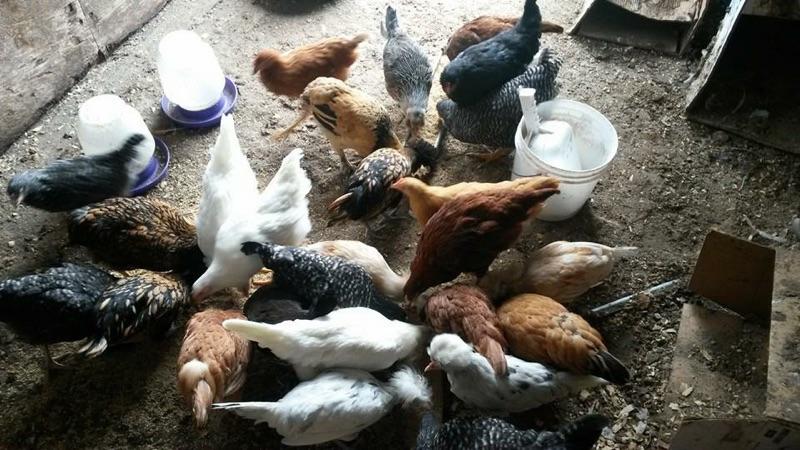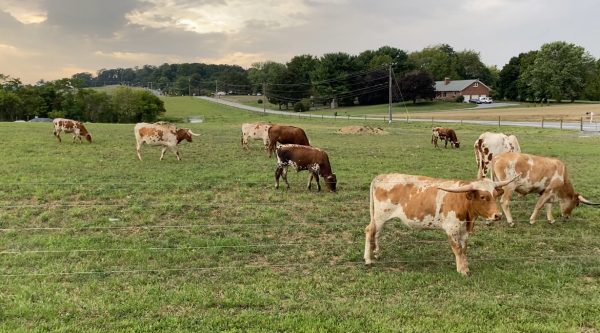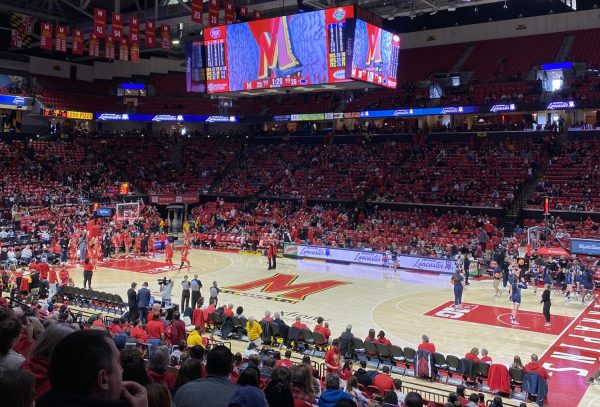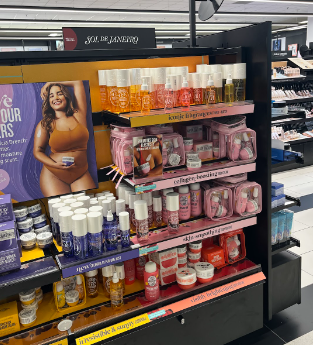The Farmer’s Market opens May 2, and local farmers need your support
Beards Farm chickens
April 27, 2015
Jeannie Beard, owner of the Bartholows dairy farm, inherited a small farm from her father Glen Beard when he became too old to do all the work himself. The work on the farm is done by Jeanie, Alex Beard (Jeannie’s daughter), Glen, and me.
Recently Jeannie and I spoke of financial problems farmers face. Jeannie told me that the best way to support your local farms is to shop at your local farmers’ market, and buy directly from the farmers near you. In fact, the Frederick Farmers’ Market opens May 2.
Large food companies use factory farms and raise GMO crops. These methods create a abundance of inexpensive food but sacrifice consumer health and product quality. In many other countries farming like this is illegal. The fallout of this is grocery stores, of course, go for the lowest price, and smaller farms can’t compete with the prices of corporate food Titans.
The USDA estimates that 87% of farms are small family owned farms. According to The Real Truth’s magazine “The Disappearing Family Farm” “It has been estimated that living expenses for the average small family farm exceed $47,000 per year… fewer than 1 in 4 of the farms in this country produce gross revenues in excess of $50,000.”
On that budget, farmers have no room to hire the salaried workers they need. Without proper funding, the integrity of the entire farm is at risk. Lack of money means that the farmers might have to settle for the cheaper feed for their livestock, sell or eat the animals they can’t afford to raise, or use outdated equipment that can’t be replaced if broken.
Whether or not the government should provide more or fewer subsidies for farmers is controversial. My personal belief is that farms should be subsidized. If the farmers aren’t allowed to grow a certain crop on their land, or if the crops they have aren’t self-supporting, then farmers should be eligible for financial aid. This does happen in some situations, but it is not universal.
Regardless of my opinion, the fact of the matter is that the people who benefit most from subsidies, are large food corporations who buy up all the farm land for themselves and collect subsidies for growing inexpensive, GMO (genetically mutated organisms), low quality crops. The family farmers, who truly care about their products, receive little.
On the Beard’s land they grow corn, collect eggs and milk cows and have a small family garden. The majority of their crop is corn, and almost all of their corn goes to feeding the livestock. They sell their milk, eggs, and surplus corn to grocery stores. Unfortunately, for every dollar spent on produce at the grocery store only 16 cents goes to the farmer, according to the CNN EATocracy article “Where does your grocery money go? mostly not the farms.”
Beard shared with me that she thinks a large reason farmers’ markets aren’t as popular is because of the stigma and myths that come along with shopping at a farmers’ market.
A common myth is that farmers’ markets are outrageously more expensive than grocery stores. This is not true at all. In a study done by Northeast Organic Farming Association of Vermont, “Prices at farmers’ markets for conventionally grown produce items were lower than they were at supermarkets. For organic items, farmers’ markets beat grocery stores every time hands down.”
Especially when it comes to specialty items (truffles, certain mushrooms, etc.) it’s almost guaranteed these products would be cheaper at the farmers’ market. The grocery stores that buy unconventional food charge ridiculous mark up costs because try to accommodate for the amount of time it will take to sell.
Farmers markets are real businesses. If they are selling food claiming to be organic, you can ask the farmer to show you their organic certificate, if it isn’t already on display. They also follow food regulations like grocery stores. You won’t find dirty, tarnished, or rotten produce there. When you get there and you don’t know what something is, ask to try it. Farmers normally allow free samples if you ask. From my experience farmers’ markets are the place to go to get higher quality food.
In a Reader’s Digest article, “13 things you should know about farmers’ markets,” they say “for every hundred dollars spent at a farmers market, 66 dollars of it go directly back into the state economy.” The rest goes to supporting the family that the grew the food you bought as opposed to grocery stores that get their produce from states like California and Florida.
What I am asking of our community is to support the local businesses and farmers by buying your food at the local farmers’ market in downtown Frederick, go to your local farm and buy directly, Or go online and find a CSA (community supported agriculture) near you that carries produce you like and have it delivered to your door weekly. The Frederick Farmers’ Market opens on May 2. I’ll see you there!












